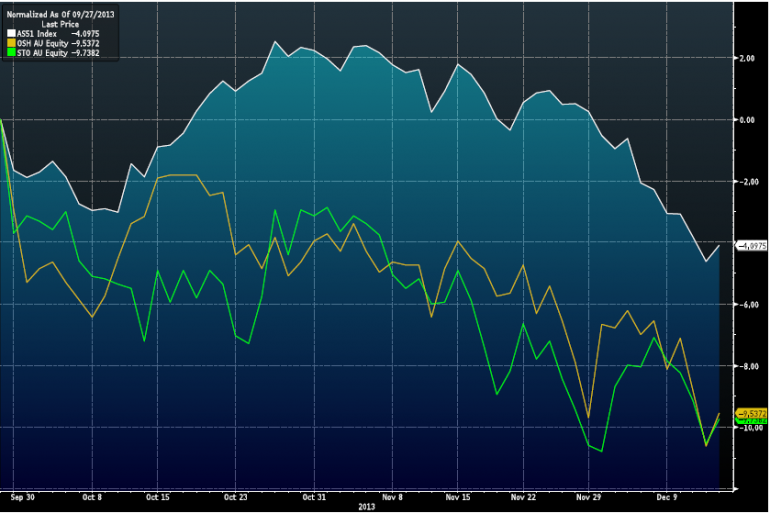Tricky time for oil
Global financial markets are starting to have a taper tantrum and what we have seen in some markets could just be a taste of what is to come.
Equity markets and gold have been out of sorts, oil could soon follow suit.
Excessive liquidity courtesy of the Federal Reserve has propped up commodity prices, including oil, which along with gold is one of the more sensitive financial assets to just about every metric when it comes to determining price. When tapering comes, the withdrawal of liquidity could impact the money supply and, in conjunction with a stronger US dollar, move the price of oil and theoretically other US dollar-based commodities lower.
The potential fallout for the oil market from tapering in part helps to explain why Oil Search (yellow line) and Santos (green line), companies considered growth plays across the oil sector, have underperformed the broader ASX 200 (white line) by more than five per cent since late September. Global growth for 2014 has also been revised lower by the Organisation for Economic Co-operation and Development (OECD), not helping the oil markets along the way.

Oil markets have to consider more than just tapering. The US is positioning itself to be a force, impacting not just the actual price but the general market structure.
As both an importer and exporter of petroleum products, the US is in a unique position of global trade. Should the export ban be lifted on the export of crude oil from the US, oil would be in abundance in global markets.
Extra supply for the US and a supply increase from Libya and Iran could realistically see oil supply in excess of demand, pushing oil prices lower in the near term. Geopolitical risk for the most part has abated, however it is a given any tensions would cause the oil price to spike higher.
Western markets have become used to the Middle East collecting most of the attention when it comes to oil. Increased influence of the US in oil markets in conjunction with the repercussions of tapering could change this.
Apart from the capitulation of the oil market at the height of the financial crisis, the price of oil has usually only gone up. Changes in global financial conditions in conjunction with supply and demand metrics could mean this will all change. It would be unrealistic to think oil is immune from developments across energy markets, efficiency improvements and changing demographics.













